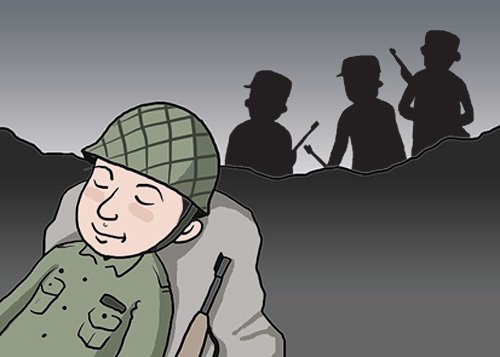Why blitz works in warfare
Why blitz works in warfare
Posted July. 28, 2020 07:56,
Updated July. 28, 2020 07:56

“On June 8 in 1950, the North Korean government declared to hold an election encompassing both Koreas and to form an integrated national assembly before August 15. The declaration was a prelude to war, but no one paid attention.” “This Kind of War: The Classic Korean War History of the Korean War,” which was penned by T.R. Fehrenbach, an officer in the U.S. Army, begins like this.
Triggering war between nations doesn’t happen naturally. If it is triggered by a blitz, the theoretical possibility becomes even slimmer if not downright impossible. Not being detected while prepping tens of thousands of troops for attack would take a miracle.
It may have been more probable in the past when telecommunications technologies were not advanced enough. But even in the modern times, blitz attacks on a massive scale have happened a few more than none. France was caught off guard against German invasion both in the first and second World Wars. The same holds true for the war between Nazi Germany and the Soviet Union, as well as the Korean War.
In all cases mentioned above, blitz worked. They refused to recognize the danger. They refused to have their vulnerabilities exposed and be warned. Because they had no alternative to propose to their bosses.
Even with the right intelligence, it was impossible to respond. Across the frontline divisions, the troops were placed too far off. The first responses from the Second and Seventh Divisions right after the Korean War broke out are still a subject of controversies. The soldiers from the Second Division were reportedly sitting on the road, doing nothing. Was their inaction against their will or not?
The Sixth Division, the only unit who won on June 25, had enough troops as they hadn’t allowed Sunday leaves. The focusing of gunners was accurate, and reserve armies arrived quickly. The attacking side, the Second Division from North Korea, lost 40% of their troops in a single day.
People say South Korea is much stronger than North Korea in its military and economic strengths. But the fate of war is not always decided by numbers or weapons. History tells us that even the strongest nation can fall. If the military is not ready to fight for real, and the people are blindly seeking pleasure, the country cannot defend itself.





![[단독]위기의 K배터리…SK온 ‘희망퇴직-무급휴직’ 전격 시행](https://dimg.donga.com/c/138/175/90/1/wps/NEWS/IMAGE/2026/02/20/133389142.1.jpg)

